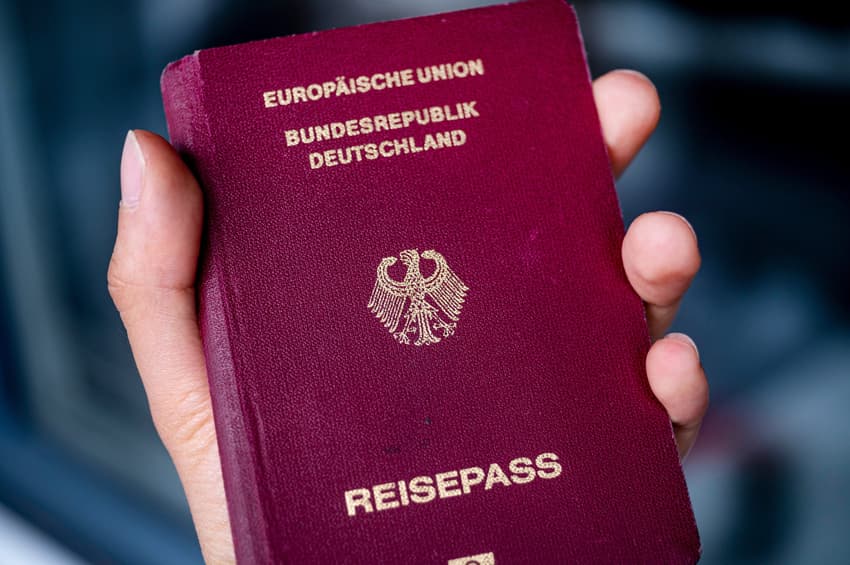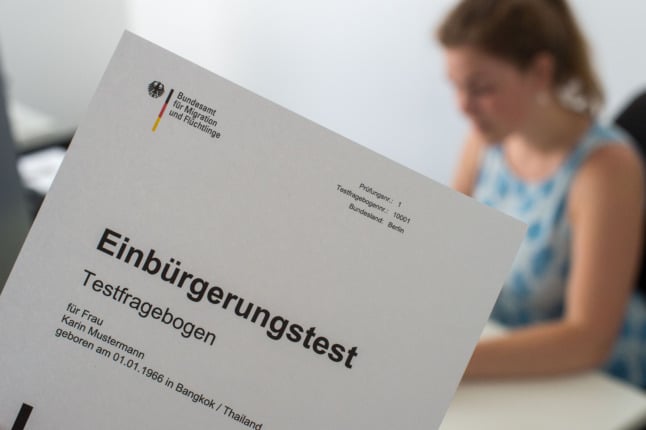Six surprising German citizenship rules you should know about

Receiving - and sometimes even keeping - German citizenship is not always so clear cut. Here are six interesting facts you might not yet know about becoming German.
If you are a foreign national living in Germany and hope to get naturalised one day, you have probably done your homework about all the citizenship laws - ranging from residency and language requirements to costs of applying.
In case you haven’t, you can view our collection of German citizenship articles covering all of these topics.
But even if you are well-versed in what it takes to acquire German citizenship, you may still be surprised to learn about some of the rules and regulations in place.
Note that the law on dual citizenship is likely to change later this year, making it easier for foreigners in Germany to become German passport holders without giving up their original nationality.
READ ALSO: TIMELINE: When might Germany's delayed dual citizenship reform pass?
Being born a dual citizen - and later having to choose a nationality
Any child born to two foreign parents in Germany after January 1st, 2000 is eligible for German citizenship - as long as one parent has lived in the Bundesrepublik for at least eight years and holds permanent residency.
It used to be that all of these children would have to choose between German and foreign citizenship on their 21st birthday. But Germany now only requires this choice to be made for those who largely grew up in their parents' home country rather than Germany.
You don’t need to speak any German to become German (in some cases)
As a rule, an intermediate level of German (or B1 in the European Framework of Languages) is required in order to become a naturalised citizen. But if you already have a German parent - or even German relatives in some instances - you automatically qualify for a German passport, even if you yourself don't speak a word of German and have never set foot in Germany.
Those born to a German citizen and foreign parent can also automatically hold two or more passports if the other country allows it - although the new dual citizenship reform will make this a possibility for almost all naturalised citizens.
Wedlock no longer matters (as much)
Most people know that having a German parent automatically means you can have a German passport, but that wasn't always the case.
Those born between January 1st, 1914, and December 31st, 1974 to a foreign mother and German father out of wedlock did not qualify for German citizenship themselves - and could only receive one if they faced becoming stateless otherwise.
However, anyone born within this time frame can retroactively claim German citizenship by proving who their father was (with a birth certificate, for example).
Also, foreign women who married a German previously received German citizenship automatically - but by 1970, foreign spouses were only able to naturalise if certain requirements were met.
Being a social sciences junkie doesn’t mean you can pass a German citizenship test
Germany’s citizenship test, which consists of 33 questions chosen at random from a data bank of 330 questions, is not surprisingly filled with all sorts of political and historical trivia from various eras.

A woman completes the German citizenship test. Photo: picture alliance/dpa | Lino Mirgeler
But this being the country of "Dichter und Denker" (poets and thinkers), you can expect a few art and culture-oriented questions thrown in there as well. They range from easy ones (we hope!) like being asked to identify the German composer behind the "9th Symphony" to trickier ones such as needing to know who is featured in famous German artist Caspar David Friedrich's painting set in the Baltic Sea island of Rügen.
But if you're not up to speed with every aspect of art - well-known or not - don't worry. You only have to answer 17 out of the questions correctly in the one-hour time frame in order to pass the test.
READ ALSO: What I was asked about in my German citizenship test
A type of citizenship that sounds like a maths equation
'Derivative citizenship' may sound complicated, but it simply means deriving (or gaining) citizenship from someone else who meets the requirements for it earlier than you do. In other words, you can apply at the same time as your spouse - or minors can apply at the same time as their parents - in order to gain citizenship together.
Being stateless can expedite the process of gaining German citizenship
If you are stateless, you are eligible for German nationality quicker than many other foreigners.
Being ‘stateless’ means you don’t have any nationality.
This can happen, for instance, if children are born in a country that does not allow their parents to pass on nationality through family ties.
At the end of 2022, there were 29,455 stateless people in the Bundesrepublik, and a further 97,150 people listed as having an ‘unclear nationality’, according to Statista. Nearly half of all these stateless people come from Syria.
Yet Germany offers stateless people a faster track to citizenship, with the exact amount of time required depending on their nearest foreigner's authority. But, in general, stateless children born in Germany can get citizenship after five years.
Comments
See Also
If you are a foreign national living in Germany and hope to get naturalised one day, you have probably done your homework about all the citizenship laws - ranging from residency and language requirements to costs of applying.
In case you haven’t, you can view our collection of German citizenship articles covering all of these topics.
But even if you are well-versed in what it takes to acquire German citizenship, you may still be surprised to learn about some of the rules and regulations in place.
Note that the law on dual citizenship is likely to change later this year, making it easier for foreigners in Germany to become German passport holders without giving up their original nationality.
READ ALSO: TIMELINE: When might Germany's delayed dual citizenship reform pass?
Being born a dual citizen - and later having to choose a nationality
Any child born to two foreign parents in Germany after January 1st, 2000 is eligible for German citizenship - as long as one parent has lived in the Bundesrepublik for at least eight years and holds permanent residency.
It used to be that all of these children would have to choose between German and foreign citizenship on their 21st birthday. But Germany now only requires this choice to be made for those who largely grew up in their parents' home country rather than Germany.
You don’t need to speak any German to become German (in some cases)
As a rule, an intermediate level of German (or B1 in the European Framework of Languages) is required in order to become a naturalised citizen. But if you already have a German parent - or even German relatives in some instances - you automatically qualify for a German passport, even if you yourself don't speak a word of German and have never set foot in Germany.
Those born to a German citizen and foreign parent can also automatically hold two or more passports if the other country allows it - although the new dual citizenship reform will make this a possibility for almost all naturalised citizens.
Wedlock no longer matters (as much)
Most people know that having a German parent automatically means you can have a German passport, but that wasn't always the case.
Those born between January 1st, 1914, and December 31st, 1974 to a foreign mother and German father out of wedlock did not qualify for German citizenship themselves - and could only receive one if they faced becoming stateless otherwise.
However, anyone born within this time frame can retroactively claim German citizenship by proving who their father was (with a birth certificate, for example).
Also, foreign women who married a German previously received German citizenship automatically - but by 1970, foreign spouses were only able to naturalise if certain requirements were met.
Being a social sciences junkie doesn’t mean you can pass a German citizenship test
Germany’s citizenship test, which consists of 33 questions chosen at random from a data bank of 330 questions, is not surprisingly filled with all sorts of political and historical trivia from various eras.

But this being the country of "Dichter und Denker" (poets and thinkers), you can expect a few art and culture-oriented questions thrown in there as well. They range from easy ones (we hope!) like being asked to identify the German composer behind the "9th Symphony" to trickier ones such as needing to know who is featured in famous German artist Caspar David Friedrich's painting set in the Baltic Sea island of Rügen.
But if you're not up to speed with every aspect of art - well-known or not - don't worry. You only have to answer 17 out of the questions correctly in the one-hour time frame in order to pass the test.
READ ALSO: What I was asked about in my German citizenship test
A type of citizenship that sounds like a maths equation
'Derivative citizenship' may sound complicated, but it simply means deriving (or gaining) citizenship from someone else who meets the requirements for it earlier than you do. In other words, you can apply at the same time as your spouse - or minors can apply at the same time as their parents - in order to gain citizenship together.
Being stateless can expedite the process of gaining German citizenship
If you are stateless, you are eligible for German nationality quicker than many other foreigners.
Being ‘stateless’ means you don’t have any nationality.
This can happen, for instance, if children are born in a country that does not allow their parents to pass on nationality through family ties.
At the end of 2022, there were 29,455 stateless people in the Bundesrepublik, and a further 97,150 people listed as having an ‘unclear nationality’, according to Statista. Nearly half of all these stateless people come from Syria.
Yet Germany offers stateless people a faster track to citizenship, with the exact amount of time required depending on their nearest foreigner's authority. But, in general, stateless children born in Germany can get citizenship after five years.
Join the conversation in our comments section below. Share your own views and experience and if you have a question or suggestion for our journalists then email us at [email protected].
Please keep comments civil, constructive and on topic – and make sure to read our terms of use before getting involved.
Please log in here to leave a comment.